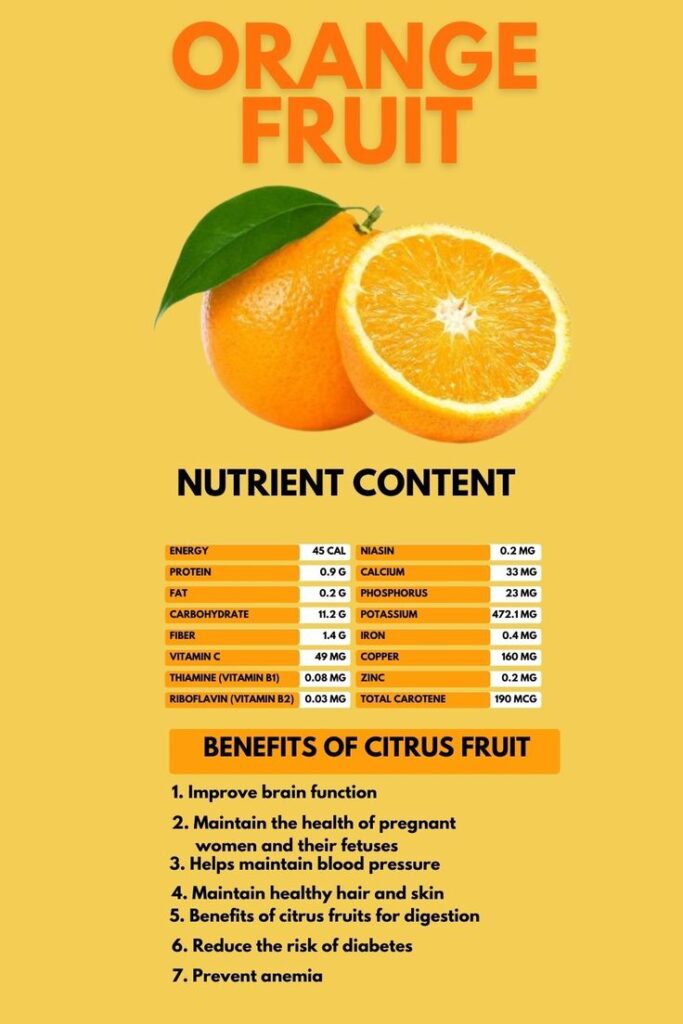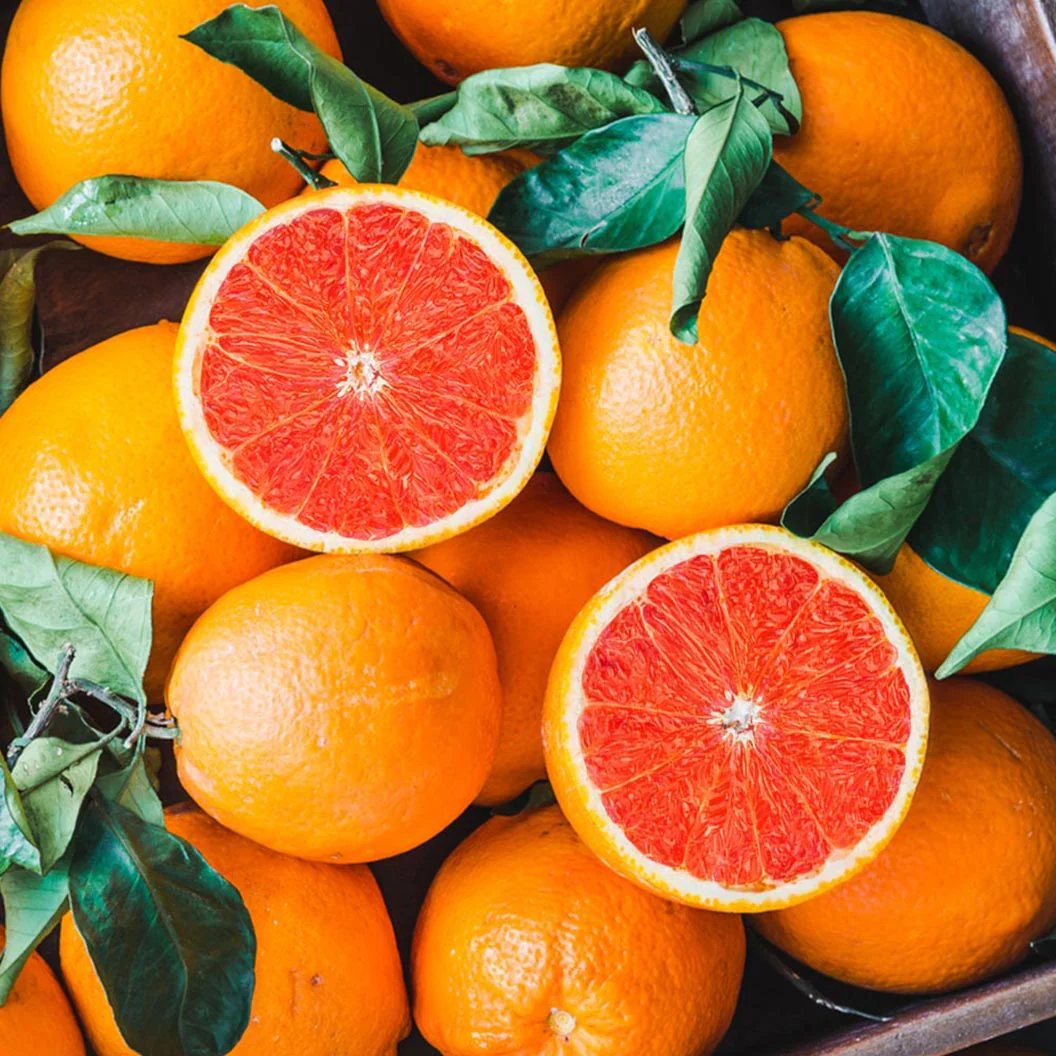Benefits of Oranges : Nutrition & Uses
Discover the benefits orange fruit—from boosting immunity and improving heart health to glowing skin and better digestion. If you’ve ever peeled a fresh orange on a hot day, you already know: there’s something special about this fruit. It’s juicy, sweet with just the right amount of tang, and always refreshing. Oranges, however, are not only sweet; they also provide numerous health benefits.
In this article, let’s walk through everything that makes oranges great. No stiff health lectures or robotic lists. Just a down-to-earth chat about a fruit you probably already have in your kitchen. Ready? Let’s get peeling.
Orange Fruit: A Simple Look at the World’s Favorite Citrus
Before we talk about nutrition labels or vitamin counts, let’s just take a step back and think about the orange itself. This fruit isn’t just some throwaway snack or a flavor in your morning juice—it’s part of daily life for millions of people around the world. Whether you’re squeezing it, peeling it, or zesting it into a cake, the orange shows up in a lot more places than you might realize.
Where Did Oranges Come From ?
Most folks think of oranges and immediately picture the sunny groves of Florida or California. But the truth is, the story of the orange began far from the American sunshine. The sweet orange we eat today (Citrus × sinensis) is actually a cross between two older fruits: the pomelo which is big and slightly bitter and the mandarin which is smaller and sweet.
Long before orange juice was a breakfast staple, the first versions of this fruit were growing in Southern China and parts of Northeast India—thousands of years ago. Ancient writings from around 2200 BCE in China mention citrus plants. Bit by bit, the fruit made its way westward—thanks to trade routes like the Silk Road and the hands of Arab traders who brought citrus into the Middle East and North Africa.
Later, European explorers—particularly the Portuguese and Spanish—picked it up and carried it to Europe and eventually the Americas. That’s how orange trees ended up thriving in places like Brazil, Florida, and southern California.
Fast forward to now, and Brazil grows the most oranges in the world—mostly for juice. India and China follow close behind, with the U.S. still holding strong, especially in juice production.
Fun stat: According to FAO (2023), oranges account for more than half of all citrus fruit grown worldwide.
What’s So Great About Oranges?
Yes, they’re sweet and juicy—but there’s more to oranges than just their taste. Here’s why people across the globe love them so much:

- Loaded with Nutrients – Oranges are famous for their vitamin C, but they’ve also got fiber, potassium, and a bunch of helpful plant compounds that support your health in quiet ways.
- Super Versatile – You can slice them, juice them, cook with them, zest the peel for flavor, make marmalade, or even use them in cleaning products and essential oils.
- They Travel Well – That thick peel acts like a natural shield. You can toss one in your bag and it’ll survive a long day, no problem.
- Good for Hydration – They’re nearly 90% water, which makes them a great choice for staying refreshed without even thinking about it.
It’s not just about the nutrients—it’s about how easy they are to enjoy in everyday life.
Types of Oranges and What They’re Best At
Oranges come in more varieties than most people realize. Some are made for eating fresh, others for juicing, and a few are great for fancy recipes.
Here’s a quick guide:
| Type | What Makes It Special | Best For |
|---|---|---|
Navel | Seedless, easy to peel, very sweet | Snacking or lunchbox treats |
Valencia | Super juicy with just a hint of tanginess | Fresh squeezed juice |
Blood Orange | Deep red flesh, berry like flavor | Salads, sauces, and desserts |
Cara Cara | Pinkish inside, low acid, packed with antioxidants | Smooth flavor for fresh eating |
Mandarins | Small, sweet, loose skin | Great for kids and quick snacks |
Each type brings its own flavor and personality to the table. If you’ve only had one kind your whole life, try switching it up—you might be surprised.
The Tree Behind the Fruit
Oranges don’t just appear overnight. The trees that grow them are tough, green year round, and full of life. A healthy orange tree can live 50 years or more. It starts with small white blossoms that smell absolutely amazing, and from those flowers come the oranges.

These trees can reach up to 20–30 feet if you let them, but many growers keep them trimmed for easier harvesting.
Most commercial orchards use grafted trees. That means growers combine a high quality fruit bearing top called the scion with a strong, disease resistant rootstock. It sounds fancy, but it just means they want the best of both worlds: great fruit and a strong foundation.
And unlike apples that fall to the ground, oranges are usually picked by hand. It’s slower, but it helps prevent bruising. Depending on the climate, harvest season typically runs from late fall through early spring.
Benefits of Oranges: A True Vitamin C Powerhouse
Let’s not kid ourselves—when people think of vitamin C, oranges are probably the first thing that comes to mind. And for good reason.

A single medium orange (about 130 grams) gives you around 70 mg of vitamin C, which already covers more than 100% of the Recommended Dietary Allowance (RDA) for most adults. That means just one orange a day checks the box—and then some.
But what does vitamin C actually do for you? Let’s break it down properly, with the real science behind each point.
1. Strengthens Your Immune System – Not Just a Cold Fix
It’s not just about “boosting immunity” in a vague way. Vitamin C helps support the function of various immune cells, including white blood cells like phagocytes and T-cells, which are the front line fighters your body sends out when there’s an infection.
A 2017 review in Nutrients found that vitamin C not only stimulates the production and function of leukocytes but also helps your body clear out old cells and make space for new ones.
And while popping an orange won’t cure a cold, research shows that people who get enough vitamin C may experience shorter and milder colds than those who are deficient.
2. Works as a Powerful Antioxidant – Protects Your Cells
Our bodies are constantly under attack from things called free radicals—unstable molecules caused by pollution, stress, sunlight, and even normal body processes. If these free radicals build up, they can damage cells, DNA, and even lead to diseases over time.
That’s where vitamin C steps in.
It’s a potent antioxidant, which means it helps neutralize free radicals before they do too much harm. According to research from the National Institutes of Health (NIH), vitamin C also helps regenerate other antioxidants in the body, like vitamin E, making it a team player in cellular protection.
This antioxidant role is also one reason scientists think vitamin C might play a part in lowering the risk of chronic diseases, like heart disease and cancer, though more long term research is still ongoing.
3. Boosts Iron Absorption – Especially for Plantm Based Diets
Iron is essential for energy, oxygen transport, and blood production—but not all iron is created equal. The iron found in plant foods (non heme iron) is harder for your body to absorb compared to the iron in meat (heme iron).
That’s where vitamin C comes to the rescue.
Vitamin C actually binds with non heme iron in your digestive system and turns it into a form your body can absorb more easily. A classic study published in The American Journal of Clinical Nutrition showed that just 50 mg of vitamin C less than what’s in one orange can increase iron absorption from a plant based meal by up to 4-6 times.
So, if you’re eating lentils, spinach, or other iron rich veggies, pairing them with orange slices or juice can make a big difference in how much iron your body actually uses.
4. Promotes Collagen Production – Keeps Your Skin and Tissues Healthy
Vitamin C isn’t just good for what’s going on inside—it also shows up on your skin.
Your body needs vitamin C to produce collagen, which is the main protein that gives structure to your skin, blood vessels, tendons, and even bones.
When you don’t get enough vitamin C, collagen production slows down, which can lead to slower wound healing, bruising easily, and even dry or sagging skin.
That’s why some skin care products brag about “vitamin C serums”—but truthfully, getting it from your food helps your body support collagen from the inside out.
According to a study in Nutrients (2017), higher vitamin C intake was linked with better skin appearance and fewer wrinkles in middle aged women, especially when combined with a balanced diet rich in fruits and vegetables.
Benefits of Oranges: Good for Your Heart
Heart disease is one of the leading causes of death worldwide, and what you eat plays a big role in heart health.
Oranges are loaded with nutrients that are great for your heart:
- Potassium: Helps regulate blood pressure by balancing sodium in your body.
- Fiber: Especially soluble fiber, helps lower bad cholesterol (LDL).
- Flavonoids: These natural plant compounds help reduce inflammation and improve blood vessel function.
A 2017 review in the Journal of Nutritional Biochemistry found that regular consumption of citrus fruits is linked with a lower risk of cardiovascular diseases. Pretty cool, right?
Benefits of Oranges: Digestive Health Helper
Ever feel bloated or sluggish after a heavy meal? A good orange might just help get things moving again.
Here’s how:
- Oranges are high in dietary fiber—especially if you eat the pulp or slices instead of just drinking juice.
- They contain natural water content, which helps hydrate your gut.
- The citric acid in oranges may even help reduce the risk of kidney stones.
When I’m having a slow digestion day, a couple of orange wedges really help. Plus, they taste way better than most fiber supplements.
Benefits of Oranges: Skin That Glows
We all want healthy, glowing skin, right? Oranges help from the inside out.
Here’s what they do:
- Vitamin C stimulates collagen formation, keeping skin tight and supple.
- The antioxidants fight off free radicals, which can age your skin prematurely.
- Oranges are also hydrating, which your skin absolutely loves.
Some people even use orange peel masks, but honestly? Eating the fruit does plenty.
Benefits of Oranges: Oranges and Weight Loss
Now let’s talk about something a lot of people are curious about—can oranges help with weight loss?
The answer is: they can definitely help support it.
Why?
- Oranges are low in calories and high in nutrients.
- The fiber helps you feel full longer, reducing the urge to snack.
- The natural sweetness satisfies sugar cravings without turning to candy or desserts.
Instead of reaching for a sugary snack in the afternoon, try a fresh orange. It’ll curb your craving and give you real energy—not a sugar crash.
Benefits of Oranges: Keeping Your Eyes Healthy
Bet you didn’t think about your eyes when you bit into an orange, huh? But citrus fruits like oranges actually support eye health, too.
They contain:
- Vitamin C –maintains healthy blood vessels in the eyes.
- Carotenoids – like beta carotene, which converts to vitamin A, important for vision.
- Lutein and zeaxanthin –Antioxidants can lower the risk of age related macular degeneration.
It’s like your orange is working behind the scenes to keep your eyesight sharp.
Benefits of Oranges: Strengthening Bones and Joints
While oranges aren’t rich in calcium like milk, they do contain nutrients that support bone health:
- Vitamin C – helps form collagen, which supports cartilage.
- Potassium – helps prevent bone loss.
- Magnesium – has a part in bone development.
Some fortified orange juices even come with added calcium and vitamin D, making them even better for your bones. Not bad for a fruit you can grab from a basket on your table.
Benefits of Oranges: A Natural Stress Buster
Feeling overwhelmed? An orange might not solve your problems—but it can definitely help calm you down.
There’s actually some science behind this:
- The smell of orange has been shown to reduce anxiety and boost mood.
- Vitamin C helps to control cortisol, the stress hormone.
- Just peeling and eating carefully can be a form of mini meditation.
Next time you’re stressed, take a deep breath—and maybe grab an orange instead of a chocolate bar.
Benefits of Oranges: Easy to Add to Your Diet
One of the best things about oranges is how simple they are. No prep needed. Just peel and eat.
But if you want to switch it up, here are some fun ways to enjoy oranges:
- Add slices to a green salad with spinach and walnuts.
- Add the segments to a yogurt dish with the honey and oats.
- Use fresh juice in a vinaigrette for chicken or roasted vegetables.
- Blend with carrots and ginger for a refreshing smoothie.
- Freeze orange slices for a natural popsicle.
I even like keeping a few slices in my water bottle—it makes plain water feel like a treat.
Benefits of Oranges: A Word About Orange Juice
Yes, orange juice is tasty. But here’s the deal—whole oranges are better for you than juice.
Why?
- Whole oranges have fiber, which juice lacks.
- Juice is easier to overconsume, meaning more sugar and calories.
- Many store bought juices are pasteurized, which reduces some nutrients.
If you love OJ, go for a small glass of fresh squeezed, and don’t make it your main source of fruit.
Benefits of Oranges: Oranges Around the World
Oranges are loved all over the globe. In many cultures, they symbolize good luck, prosperity, and health.
- In Chinese New Year celebrations, oranges are gifted for good fortune.
- In the Mediterranean, oranges are often used in savory cooking.
- In the Caribbean, orange peels are added to herbal teas and remedies.
It’s amazing how one fruit can mean so much across different places.
Any Downsides?
Not many—but there are a couple of things to keep in mind:
- If you eat too many oranges, the acidity can irritate your stomach or enamel.
- People on certain medications should ask their doctor about citrus interactions.
- Orange peels can have pesticides—so wash thoroughly if you’re using them in cooking.
But for most people, 1–2 oranges a day is safe and super beneficial.
Orange Fruit Summary Table
| Aspect | Details |
|---|---|
| Scientific Name | Citrus sinensis |
| Common Names | Orange, Sweet Orange, Malta (in South Asia), Naranja (in Spanish) |
| Origin | South and East Asia (hybrid of pomelo and mandarin) |
| Main Nutrients | Vitamin C, Fiber, Potassium, Folate, Thiamine (B1), Antioxidants |
| Calories (per 100g) | ~47 kcal |
| Key Benefits | Boosts immunity, supports heart health, aids digestion, skin glow, hydration |
| Best Season | Winter to early spring (Nov–March in South Asia) |
| How to Eat | Fresh, juice, zest, smoothies, salads, desserts |
| Popular Varieties | Navel, Valencia, Blood Orange, Jaffa, Cara Cara |
| Storage Tip | Store in cool, dry place or refrigerate for longer freshness |
Benefits of Oranges – Summary Table
| Benefit | Details |
|---|---|
| Boosts Immunity | High Vitamin C content helps the body fight off infections and viruses. |
| Supports Heart Health | Contains potassium, flavonoids, and fiber that reduce blood pressure & cholesterol. |
| Aids Digestion | Rich in dietary fiber that promotes smooth bowel movements. |
| Improves Skin Health | Antioxidants like Vitamin C help reduce wrinkles and improve skin glow. |
| Hydrates the Body | Oranges are ~87% water—great for keeping you hydrated. |
| Helps in Iron Absorption | Vitamin C improves absorption of plant based (non heme) iron. |
| Lowers Inflammation | Rich in flavonoids and antioxidants that reduce inflammation. |
| Weight Management | Low calorie and high fiber—keeps you full without extra calories. |
| Improves Eye Health | Contains carotenoids and Vitamin A precursors that support vision. |
| May Reduce Cancer Risk | Antioxidants and compounds like D-limonene may help protect against cancer. |
Final Thoughts
So, after all that—what’s the takeaway?
Oranges are more than just a lunchbox fruit or a vitamin C fix. They’re a full package of health benefits, from your immune system to your skin, heart, digestion, and even your mood.
They’re:
- Affordable
- Easy to find
- Naturally delicious
- Packed with good stuff
Whether you eat them whole, toss them in a salad, or just keep one in your bag for later, oranges are a simple way to do something good for your body every single day.
References:
- National Institutes of Health – Office of Dietary Supplements: Vitamin C
- Journal of Nutritional Biochemistry (2017) – Citrus and Cardiovascular Health
- Mayo Clinic – Dietary Fiber and Heart Health
- Harvard Health Publishing – Benefits of Flavonoids
- Cleveland Clinic – Vitamin C and Immunity
- USDA FoodData Central – Orange Nutritional Profile
- Journal of Agricultural and Food Chemistry – Citrus Aroma and Stress Response
Orange Fruit FAQ: What People Usually Ask
Oranges are definitely famous for their vitamin C, but fun fact—they’re not actually the top source. Fruits like kiwi, guava, and even red bell peppers can pack more vitamin C per bite. Still, oranges are an easy, tasty, and reliable way to get your daily dose. One medium orange usually does the trick.
Not quite. The biggest difference? Fiber.
When you eat the whole fruit, you get that natural fiber, which helps with digestion and keeps your blood sugar steady. Juice—even if it’s fresh—loses most of that fiber and ends up being much more concentrated in sugar. So, while a glass of OJ can be refreshing, munching on the fruit is the healthier option.
You can—though most people don’t. Orange peels aren’t harmful, and they do have fiber, vitamin C, and some interesting compounds like essential oils. But the taste is bitter, and the peels are often treated with wax or pesticides. If you’re going to use them for zest or candy, try to go for organic oranges and give them a good scrub first.
This really depends on the person. Oranges are pretty acidic, and for some folks, that can trigger reflux or heartburn. If you notice a burning feeling after eating them, you might want to cut back or switch to fruits that are gentler on the stomach—like bananas or pears.
For most people, one or two oranges a day is perfectly fine—and actually a great habit. They give you fiber, antioxidants, and more than enough vitamin C. But like anything, moderation is smart. Eating too many could upset your stomach or give you more sugar than you need in one sitting.
- Timothy Grass Seed – Simple Guide for Hay & Horse Owners - October 26, 2025
- Bermuda Grass Seed – Complete Planting & Care Guide - October 23, 2025
- Grass Fed Butter – Benefits, Cost and How to Choose the Best One - October 11, 2025








